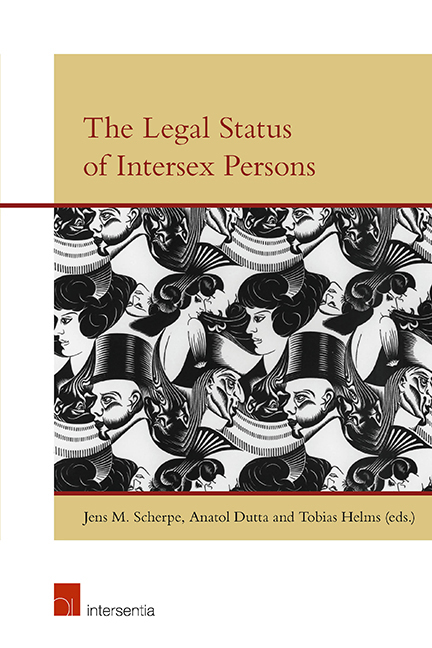Book contents
- Frontmatter
- Preface
- Contents
- List of Contributors
- The Legal Status of Intersex Persons: An Introduction
- Malta Declaration
- Darlington Statement
- Vienna Statement
- PART I MEDICINE AND PSYCHOLOGY
- PART II THEOLOGY AND LEGAL HISTORY
- PART III TRANSGENDER, TRANSSEXUALITY AND INTERSEX
- PART IV NATIONAL LEGAL DEVELOPMENTS
- PART V PRIVATE INTERNATIONAL LAW ASPECTS OF INTERSEX
- PART VI INTERSEX AND HUMAN RIGHTS
The Legal Status of Intersex Persons: An Introduction
Published online by Cambridge University Press: 31 January 2019
- Frontmatter
- Preface
- Contents
- List of Contributors
- The Legal Status of Intersex Persons: An Introduction
- Malta Declaration
- Darlington Statement
- Vienna Statement
- PART I MEDICINE AND PSYCHOLOGY
- PART II THEOLOGY AND LEGAL HISTORY
- PART III TRANSGENDER, TRANSSEXUALITY AND INTERSEX
- PART IV NATIONAL LEGAL DEVELOPMENTS
- PART V PRIVATE INTERNATIONAL LAW ASPECTS OF INTERSEX
- PART VI INTERSEX AND HUMAN RIGHTS
Summary
AIM AND PURPOSE OF THIS BOOK
Issues surrounding legal gender have been the subject of much debate in the last decades, at least in the Western jurisdictions. However, much of this debate was focused on recognition of the preferred gender, i.e. the legal issues surround the legal status of transsexual and transgender persons. the legal issues concerning intersex persons, which are distinct and must be considered as such, have received much less attention, particularly in national jurisdictions. From a legal perspective, the key issues are (1) the designation of a legal gender and the right to a gender identity, and (2) the legitimacy of surgical and other medical interventions, as well as injuries caused by them, particularly on new-borns without the capacity to consent. Particularly the latter is of grave concern, and there is a wide debate about the soundness of judicial deference to the clinical management of these conditions as primarily medical matters, as it has become apparent that irreversible surgical interventions and hormonal therapies have been carried out on infants and very young children without long-term data confirming their necessity, safety and efficacy.
The aim of this book is to highlight the need and urgency to deal with these crucial issues, and by providing a wide range of accessible material to make these issues more visible to the general public and thus to further and broaden the debate. To this end, this book not only comprises purely legal views (Parts III–IV), but also medical and psychological (Part I) as well as theological and historical ones (Part II).
TERMINOLOGY
But in order to engage in any debate, it is necessary to deal with matters of terminology first, which can be very controversial. It is important to acknowledge at the outset that experiences of gender and sexed bodies are deeply personal and therefore inevitable vary from person to person. Hence, it is impossible to choose a terminology that would reflect everyone's experience of self, and any term chosen therefore may be perceived as inappropriate and even as hurtful. Therefore, it is important to state clearly that the intention of all authors of this volume is to be respectful, and that no offence or disrespect is intended.
- Type
- Chapter
- Information
- The Legal Status of Intersex Persons , pp. 1 - 6Publisher: IntersentiaPrint publication year: 2018
- 1
- Cited by



